A segment of the classic world harbors a passion for vintage racecars, focusing on the preservation of machinery to protect our racing history. Owners often dismantled these older cars to use as donors for their latest slice of racing machinery, but a few survived largely untouched. That is the story of this 1964 MG Midget, and its drivetrain upgrades should lift its performance to a level the car’s original designers could only dream of. It needs a new home, with the seller listing it here on Craigslist in Riverside, California. The owner set their price at $7,300, and I must say a big thank you to Barn Finder T.J. for spotting this beauty.
The first MG Midget appeared in 1961, with the production version soldiering on gamely until 1980. Our feature car rolled out of the factory in Abingdon, England, in 1964. Its history from there is unclear, so there’s no way of knowing when it morphed from a road car to a racecar unless the seller retained the original Log Book. It features many changes to assist its racing exploits, including a rather cool fiberglass tilt front. This one-piece unit would be lighter and more aerodynamic than the original steel, with any racer telling you that weight is the enemy of performance on the track. The builder added rear fender flares to accommodate the wider Minilite wheels and racing rubber. The hood doesn’t meet the cowl as neatly as the production version, but it is acceptable for a car destined for track duties. The vehicle requires a few items to present at its best. The hood may have featured a scoop to clear the powerhouse hiding in the engine bay, and locating an appropriate one shouldn’t be complicated or expensive. The Silver paint carries a few chips and marks, and the buyer may elect to perform a repaint to return the vehicle to a pristine state. However, some owners focus on preservation to help protect a car’s history. That is an option they might consider with this MG. The windshield looks excellent, and there is no evidence of rust.
Tilting forward this MG’s hood reveals an engine offering performance well beyond that provided by the original 1,097cc A-Series four-cylinder unit. It produced 57hp that fed to the rear wheels via a four-speed manual transmission. The modest power output makes the ¼-mile ET of 19.9 seconds and a top speed of 93hp unsurprising. However, these classics tip the scales at a mere 1,565lbs, meaning any power increases make a profound performance difference. This car’s creator consigned the A-Series to the trash, slotting in a twin-cam 2,366cc Toyota 22R motor bolted to a four-speed manual transmission. The engine’s vintage is unknown, and its output is pure speculation. It inhales deeply through a downdraft Weber carburetor, and the buyer can rightfully expect twice the power supplied by the original motor. The builder added a remote oil system and catch tank, which should help reliability by eliminating oil starvation and surge. That isn’t the end of the story because there is a nitrous system to consider, which could make this MG a jet when it kicks in. The seller indicates this racecar needs new tires and an exhaust. Otherwise, it is ready to roll onto the nearest track for a spot of fun.
To reduce weight and improve safety, racecars of this type are usually stripped of interior trim, upholstery, and carpet. Anything inside a racecar is there for a reason, and that’s the case with this MG. The dash houses a collection of gauges to monitor this classic’s mechanical health and performance. A Kirkey seat wraps around the driver, with a Simpson harness holding them firmly in place. There’s a thick wheel offering excellent grip, a stubby shifter for the transmission, a sturdy rollbar for protection, and a Halon fire suppression system if it gets too hot in the kitchen! Everything appears in good condition, but there are items I might replace if venturing onto the track. The harness looks older, and a new one would go in as a matter of course. The existing seat may be fine, but it offers no lateral head support in a side impact. I would probably invest $1,000 in an updated Kirkey or Ultra Shield seat for safety’s sake. Otherwise, this interior needs nothing.
Classic racecars generally don’t appeal to purists due to their changes. However, they are becoming highly sought by those wishing to preserve our motorsport heritage. Placing a value on a vehicle of this type is challenging because they come under the umbrella of any modified vehicle. That means they are worth what someone is willing to pay. However, prices can prove stratospheric for the right car. This 1964 MG Midget is an affordable option, and its upgraded drivetrain should offer enough performance to plaster a mile-wide smile on the next owner’s face. I don’t have a problem with that. Do you?
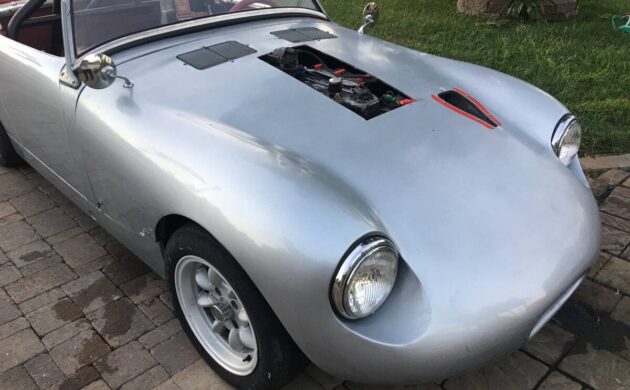
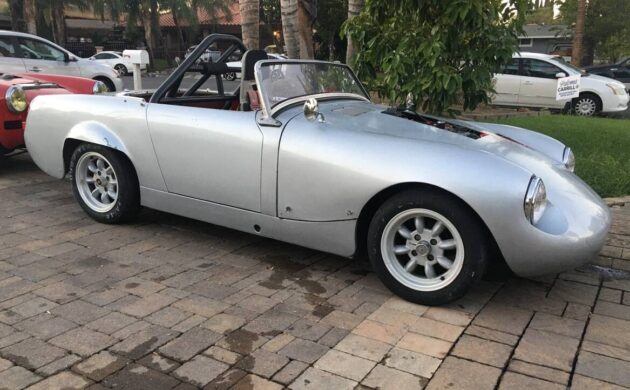
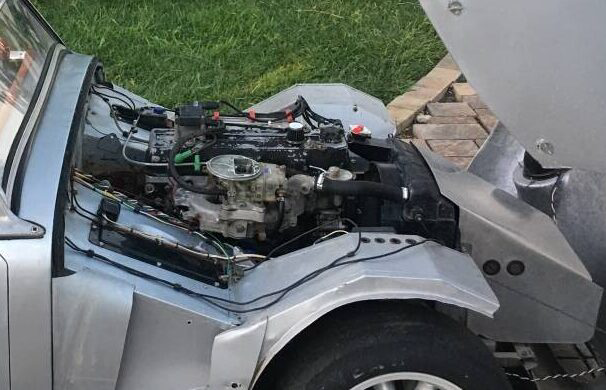
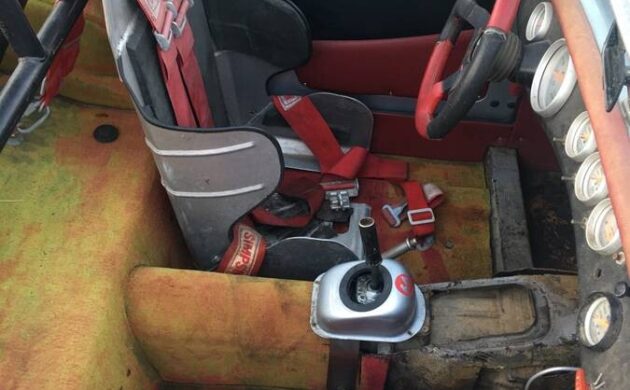
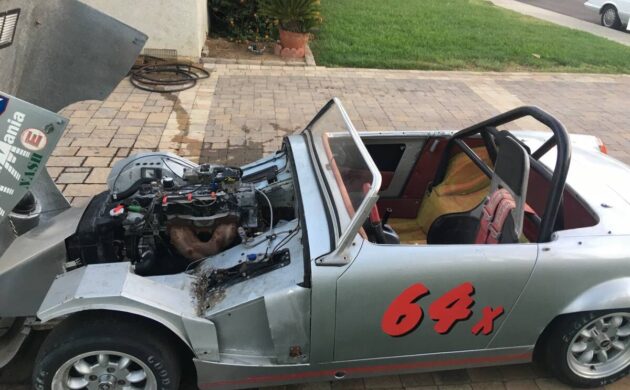



Interesting car. Kirkey makes add on head restraints for these seats. We run this exact seat in our two cars and got to test them in a ’17 bout with a concrete barrier at Sebring International Raceway. Not sure where you would run this car except for track days where anything goes. No good for SCCA road racing and doesn’t qualify as a Vintage race car. Picture shows the add on Kirky units.
Not sure what “remote oil system” is in the car but it sounds like an Accusump which must be in the trunk as the two bottles on the passenger side floor are a fire suppression kit and the nitrous bottle. I could see this as an autocross car but not a race car. As stated, I bet the extra power is fun.
Autocross & hillclimbs.
Bob, It say the interior needs nothing. I laughed. To start with, there are no anti-intrusion bars. The belt need replaced. I suppose if the cage was brought back to current vintage racing specs, it could race as a “special. Also, the buyer would have to close up that gapping hot in the bonnet. The windscreen is original and makes a really good “Airbrake.” With some work, it could be a really fun little racer.
Glad it’s on the left coast…I would be tempted.
That ain’t no Weber carburetor. That’s a Holley 2-bbl with race bowl (likely the 350 cfm model 7448). If that motor’s stout enough to be comfortably fed by that shotgun Holley, it’s a pretty rorty lump of iron.
Toyota 22R: this is a SOHC engine, not a double overhead cam. “R” is carbureted, the 22RE is fuel injected. I know: I am the second owner of a 1988 Toyota extra-cab 4wd pickup truck with a 22RE engine.
Can’t vintage race this in my hometown where SOVREN sets the rules, won’t pass for SCCA either. Fire system, seat and harness need upgrade; does it have a fuel cell? Rollbar should look like bobhess’ photo- inside the door. Otherwise, take it on tours, rallies, autocross, hillclimbs.
At $7300, this thing is a bargain. You couldn’t build it for that much.
Since it isn’t “legal” for most sanctioned racing, I’d put a full interior back in it and have fun on the street. I’d also be inclined to get rid of the “beautiful” (in the seller’s words) clamshell front bodywork and either reinstall stock MKII sheet metal or a Bugeye front end, but that’s just me. You could probably get back 1/3 of the purchase price selling off the fiberglass. Also does it look like the windshield has been chopped a bit?
This reminds me so much of an buddy of mine’s ’67 Sprite that he wedged a Mazda RX3 rotary mill and trans into back in the ’70’s. That thing was insane!
Windshield has been chopped. Would need another one to be able to put a top on it for street use. Agree with your bodywork comments.
Thanks for your comment, Bob, though if I had this I don’t think I’d ever bother with a top!
I like the front end. Get rid of the rear flares, relocate the halon bottle, get rid of the nos, new seats carpet and door panel, drive it.
I have not yet read a single word of this ad.
The car looks orderly and well done.
After some brief looks at the car, I think that some reasonable care and effort were put into making it both functional and aesthetically pleasing as well.
Good luck with the sale, and to the buyer !!
Now, I am going to go back and read about this build.
Hey! I’ve got a Bugeye Sprite with a Honda Goldwing motorcycle engine!! I’d never try to pass it off as a racecar!